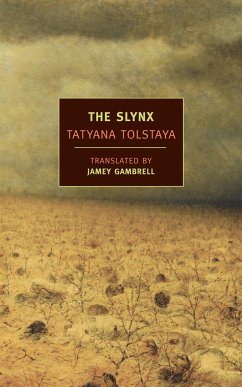"New in Paperback" "A postmodern literary masterpiece." -"The Times Literary Supplement" Ten years in the writing, Tatyana Tolstaya's only novel, "The Slynx," takes place some two hundred years after "the Blast" put an end to civilization. People in this post-apocalyptic world eat mice and worms and have forgotten how to make a fire. In the aftermath of the Blast, they suffer from what they call "consequences," ranging from tails to claws to gills, and they get around on "degenerators," mutant half-humans who run on all fours. It is a sad excuse for a life, but to our hero, Benedikt, it seems cozy enough. After all, he's happily employed as a scribe, copying various texts-including some that may seem surprisingly familiar to readers-said to be composed by Fedor Kuzmin, Glorybe, the Great Leader of this squalid land, where all other literature is prohibited to the people on pain of death. All this is the familiar stuff of dystopian fiction. Tolstaya's virtuosic trick is, however, to turn it into pure vaudeville, though vaudeville that packs a serious punch. Benedikt, the little man, is lifted into a life of privilege and given access to the books. Before long, indeed, he has become a true book-lover-which is to say, the bibliophile from hell. Like Nabokov's "Pale Fire," Tolstaya's novel is a shimmeringly ambiguous work of art: an account of an utterly degraded world that is full of echoes of the sublime literature of Russia's past; a grinning portrait of human inhumanity; a tribute to art in both its sovereignty and its helplessness; a vision of the past as the future in which the future is now.
New in Paperback "A postmodern literary masterpiece.” -The Times Literary Supplement Two hundred years after civilization ended in an event known as the Blast, Benedikt isn't one to complain. He's got a job—transcribing old books and presenting them as the words of the great new leader, Fyodor Kuzmich, Glorybe—and though he doesn't enjoy the privileged status of a Murza, at least he's not a serf or a half-human four-legged Degenerator harnessed to a troika. He has a house, too, with enough mice to cook up a tasty meal, and he's happily free of mutations: no extra fingers, no gills, no cockscombs sprouting from his eyelids. And he's managed—at least so far—to steer clear of the ever-vigilant Saniturions, who track down anyone who manifests the slightest sign of Freethinking, and the legendary screeching Slynx that waits in the wilderness beyond. Tatyana Tolstaya's The Slynx reimagines dystopian fantasy as a wild, horripilating amusement park ride. Poised between Nabokov's Pale Fire and Burgess's A Clockwork Orange, The Slynx is a brilliantly inventive and shimmeringly ambiguous work of art: an account of a degraded world that is full of echoes of the sublime literature of Russia's past; a grinning portrait of human inhumanity; a tribute to art in both its sovereignty and its helplessness; a vision of the past as the future in which the future is now.
New in Paperback "A postmodern literary masterpiece.” -The Times Literary Supplement Two hundred years after civilization ended in an event known as the Blast, Benedikt isn't one to complain. He's got a job—transcribing old books and presenting them as the words of the great new leader, Fyodor Kuzmich, Glorybe—and though he doesn't enjoy the privileged status of a Murza, at least he's not a serf or a half-human four-legged Degenerator harnessed to a troika. He has a house, too, with enough mice to cook up a tasty meal, and he's happily free of mutations: no extra fingers, no gills, no cockscombs sprouting from his eyelids. And he's managed—at least so far—to steer clear of the ever-vigilant Saniturions, who track down anyone who manifests the slightest sign of Freethinking, and the legendary screeching Slynx that waits in the wilderness beyond. Tatyana Tolstaya's The Slynx reimagines dystopian fantasy as a wild, horripilating amusement park ride. Poised between Nabokov's Pale Fire and Burgess's A Clockwork Orange, The Slynx is a brilliantly inventive and shimmeringly ambiguous work of art: an account of a degraded world that is full of echoes of the sublime literature of Russia's past; a grinning portrait of human inhumanity; a tribute to art in both its sovereignty and its helplessness; a vision of the past as the future in which the future is now.








